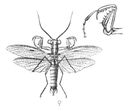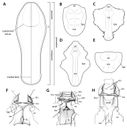Mantoididae
Mantoididae
Classification
- Phylum: Arthropoda
- Subphylum: Hexapoda
- Class: Insecta
- Order: Mantodea
- Family: Mantoididae
Pronunciation
How to pronounce Mantoididae: //mænˈtɔɪdɨˌdiː//
These audio files are automatically generated. While they are not always 100% accurate, they are a good starting point.
Images




Summary
Mantoididae is a family of Neotropical praying mantises with two recently described genera, containing notable species which display wasp-like characteristics. The family is mainly distributed in tropical Americas, with recent taxonomic revisions from 1919 to 2019 adding to its classification.
Physical Characteristics
Males have ocelli and a cylindrical body shape; fore tibiae have an apical claw and are less curved compared to closely related families. Cerci are shorter.
Identification Tips
Look for the presence of ocelli in males and the distinct body shape; species resemble certain wasps with coloration patterns, particularly Paramantoida amazonica.
Habitat
Tropical regions of North and South America, including areas in Florida.
Distribution
Primarily Neotropical with a single species found in Florida.
Evolution
Formerly represented solely by Mantoida until the description of Paramantoida and Vespamantoida in recent years; related to Chaeteessidae but with key morphological differences.
Similar Taxa
- Chaeteessidae
Tags
- Mantoididae
- Neotropical species
- praying mantis
- entomology